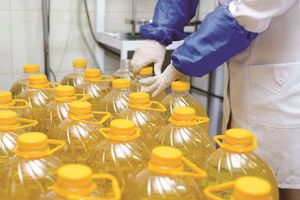
Tom Arody inspects sunflowers at his farm in Bondo, Siaya County.
Senators want President William Ruto's government to come clean on the Sh981 million edible oil crop promotion project, a programme that appears to have run into headwinds.
The lawmakers have trained their guns on the Agriculture and Food Authority (Afa) over the status of the five-year project.
Kisii Senator Richard Onyonka has raised the alarm, asking the Agriculture Committee to launch investigations into the status of the programme, how the Sh981 million was spent and in which counties it was implemented.
The senator also wants the committee, headed by Murang'a Senator James Murango, to provide details of the AFA's edible oil crop promotion project, including the justification for the project.
It should also explain how and when sunflower seeds were procured and explain to Kenyans the government's decision to procure the seeds from Zambia and not locally, especially from Trans Nzoia County.
"The committee should provide details on the distribution of the sunflower seeds across the country, disclosing the criteria for distribution, the number of farmers who have received the seeds so far, as well as the support to be offered to farmers in the short and long term," said Mr Onyonka.
Kenya's Kwanza government embarked on an ambitious project in October 2023 to promote the growth of sunflowers in the country to reduce the cost of importing edible oils and lower the price of cooking oil in the country.
Kenya spends at least Sh160 billion annually importing edible oils from other countries, making it the second highest import bill in Kenya after petroleum, yet most edible oil crops are traditional food value chains.
To bridge the gap, the government has identified about 24 counties to benefit from the promotion project to boost local production of sunflower oil and address the cost of edible oils in the country.
Through the project, the government has pumped in Sh1 billion to distribute 570 tonnes of seedlings.
The targeted counties include Nakuru, Bungoma, Busia, Uasin Gishu, Meru, Kwale, Kilifi, Homa Bay, Nyeri, Lamu, Kakamega, Kitui, Embu and Makueni.
Vihiga Senator Godfrey Osotsi added that the government should provide a list of factories in Kenya that have the capacity to process sunflower and oil seeds into edible oil, specifying whether they are government, private or cooperative-owned.
He added that the authority should also explain the initiatives the government has put in place to boost local capacity to process the expected increase in production and consumption of safflower seeds.
“We expect the committee to inquire and explain how the government plans to monitor and evaluate the implementation of this project, indicating when the evaluation report will be released,” said the ODM deputy party leader.
The project, which is being spearheaded by the Nuts and Oil Crops directorate under AFA, seeks to support availability of affordable and quality inputs, technical support on production, as well as promoting cottage level processing.
Sunflower, which is widely adapted to almost all ecological zones in the country, is one of the crops singled out as a viable alternative towards achieving self-sufficiency and import substitution.
The proposed project is aimed at contributing towards the creation of employment opportunities in a number of areas including; seed distribution, production, produce aggregation, transportation, warehousing, aggregation and agro-processing.
Accordingly, the interventions through the project are anticipated to increase domestically produced edible oil from the current 80,000 metric tonnes to 240,000 metric tonnes.
This will lead to the production of 1.5 million metric tonnes of soybean, canola and Sunflower seed for use as raw material in oil extraction.
The interventions will also expand the area under edible oil crops across 15 growing counties from the current 60,000 ha to 250,000 hectares.
The project will promote oil crops in 10 non-traditional counties, increasing the current low productivity from an average of between 0.3 and 0.5 tonnes per hectare to two tonnes per hectare.











